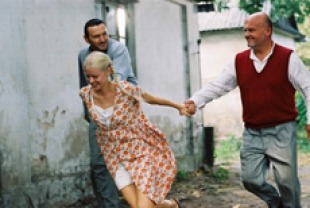"War is not an adventure. It is a disease. It is like typhus," Antoine de Saint-Exupery wisely noted. Polish author Witold Gombrowicz depicts some of the symptoms of the disease in this relaxed and fluid adaptation of his novel by director Jan Jakub Kolski. In Nazi-occupied Poland in 1943, two men leave the city for the country estate of Hipolit (Krzysztof Globisz) who lives there with his wife Maria (Grazyna B cka-Kolska) and their 16-year-old daughter Henia (Sandra Samos). Fryderyk (Krzysztof Majchrzak) is a very talented artist with experience in theatre, film, and circus. He is the kind of man you want around whenever there is a problem or trouble. "Can do" seems to be his middle-name. He also has fined tuned hearing which enables him to pick up sounds that no one else can hear. Witold (Adam Ferency), the narrator of the film, is a writer who is a keen observer of human nature.
These two middle-aged men are charmed and delighted by Hipolit's daughter who already knows how to hold the attention of the opposite sex. She is engaged to Waclaw (Grzegorz Dami cki), a lawyer. In order to amuse themselves and take their minds off the barbarity of the war and the battle between the Germans and the partisans going on nearby, Fryderyk and Witold decide to try and bring Henia and Karol (Kazimierz Mazur), a handsome young lad who is working on the manor, closer together. Having grown up together, they are friends but do not have romantic feelings for each other. Fryderyk comes up with a game they act out and manage to get Vaclaw to witness. Meanwhile, Witold comes across a family of Jews hidden in the cellar. Fryderyk fends off the sexual advances of Veronika (Anna Baniowka), a young helper in the kitchen.
The violence of the war invades the manor when a young boy stabs Waclaw's mother while trying to steal some food and Siemian (Jan Frycz), a partisan leader, is given sanctuary after a mental breakdown. He is unable to cope with the senseless death and destruction of the war. While Maria drinks to numb herself against the terrors which lurk outside her home, Fryderyk and Witold rely upon another tactic. Spiritual writer John O'Donohue has written: "Where the imagination is awake and alive, fact never hardens or closes but remains open, inviting you to new thresholds of possibility and creativity." In this drama, imagination works to keep the war at bay for a while but eventually neither music, gardening, or the matchmaking game can shield Fryderyk from a terrible and soul-shattering event from the past that rears its ugly head and roars in his ears.
Screened at The 41st New York Film Festival, October 2003.
